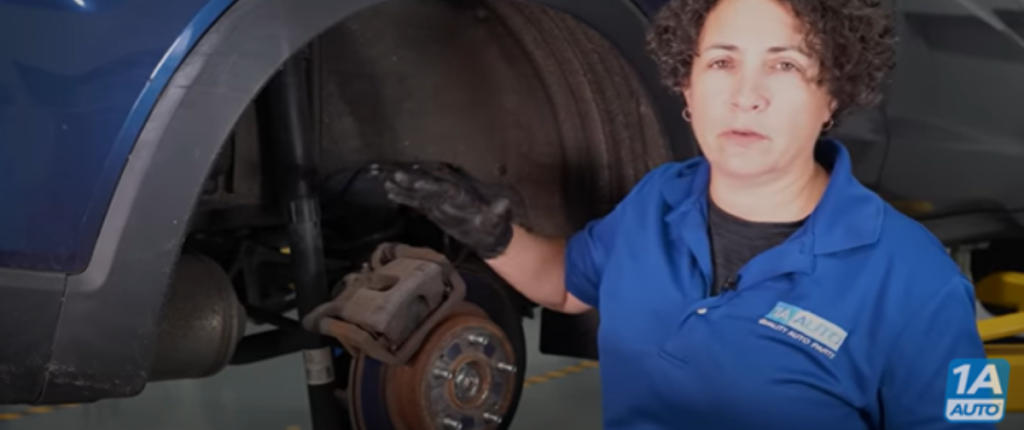You may have noticed your brakes needed replacing and you want to replace them yourself. If you replaced the brakes on your car and the brakes are squeaking after new pads have been installed, learn the common causes with these tips.
Video: Car or Truck Brakes Squealing After Being Replaced? Simple Way to Choose the Right Brake Pads
Why Are My Brakes Squeaking After Installing New Brake Pads?

Here are five common causes of squeaking brakes after new brake pads are installed. We recommend paying attention to detail, like how the pads are placed, when you replace the brakes. This will help you avoid any mistakes that you may have to fix later.
1. Brake Dust

Brake dust can build up on the brake pad and cause friction. This can make a squealing sound, especially in colder temperatures or at times of day like the morning when the brake pads are cold. The hotter the temperature the less squealing you’ll hear.
2. Brake Pads Installed Incorrectly
Wrong Brake Pads Installed
If a car needs ceramic brake pads and you install semi-metallic ones, it can cause problems when braking. Different vehicles have different types of brakes pads, and manufacturers use a particular kind.
You also can’t put metallic or semi-metallic brake pads with an aluminum brake caliper. The squeaking sound will echo throughout the cabin. If you put ceramic pads with a steel brake caliper, they won’t make a squeaking noise.
Today’s Deals

How to Tell If You Have an Aluminum or Metal Brake Caliper

You can attach a magnet to the brake caliper to find out if you have a metal or aluminum one. If the magnet sticks to the brake caliper, you have one made of metal. A magnet won’t stick to a brake caliper made of aluminum.
More on the sizes of brake pads
More on the different types of brake pads
Brake Pad Installed at a Wrong Angle
Like at 3:24 in the video featured at the top of this article, it’s normal to find gloss on the pads and the brake rotor if the pads are creating friction and can’t move in and out properly. If someone installed the brake pad at the wrong angle, it could wear and make a squeaking noise as the wheels are moving.
Brake Pads Installed at the Wrong Sides of the Vehicle
If the brake pads are installed on the wrong sides, like if both inner pads are installed on the driver side and both outer pads are installed on the driver side, that can cause a squealing sound when braking.
Video: How to Replace Front Brake Pads and Rotors on a 05-14 Subaru Outback
3. Brake Caliper Pins Not Sliding

The brake caliper pins slide the brake pads in and out against the rotor as you brake. The brake pads press against the rotor, and the friction makes the wheels come to a stop. If the brake caliper pins aren’t sliding and moving the brake pads in and out, friction can build up if the pads are stuck. If the pads are frozen in place, you might hear the squeaking sound while driving without pressing the brake pedal.
More on how to inspect a brake caliper
4. New Brake Pads Need to Break in
After installing new brake pads, you may still hear a squeaking noise despite installing everything correctly. This happens because the pads may still be “breaking in” as the new material wears away from use.
Steps to Inspect the Brakes If New Brake Pads Are Squeaking
General steps to inspect the brakes for new and squeaking brake pads
- Lift and Secure the Vehicle with a Jack and Jack Stands and Remove the Tire
Loosen the lug nuts with the vehicle on the ground with a breaker bar. Raise the vehicle with a jack and secure it with jack stands. Remove the lug nuts and tire
- Lift the Brake Caliper
Loosen the brake caliper and separate it from the brake pads. Secure it with a brake caliper hanger
- Inspect the Brake Pads for Misplacement and Dust and Rust
Look at the brake pads for brake dust. Make sure the brake pads are installed correctly. Check that the inner and outer pads are at the correct positions. See if there’s a lot of brake dust or rust. Areas like where the brake pad clips attach to the brake caliper bracket can build up rust and cause friction and squeaking.

- Clean and Grease Brake Parts That Need It
Clean the brake parts like caliper, brake caliper bracket, brake pad brackets
Place grease on the caliper bracket where the brackets meet with the brake caliper
How-to Videos for Your DIY Car Repairs
Don’t know the steps for a certain repair or want to learn how to do a new one? Find videos in our how-to video library for different skill levels and follow the step-by-step instructions from our expert mechanics.
Related Articles and More Tips
- Different Types of Disc Brakes
- How Long Do Brakes Usually Last?
- Brake Installation Tips: How to Change Brake Pads, Brake Rotors, Brake Calipers, and More Correctly
- Brakes Squealing? It’s Probably Time for New Brake Pads
- Why Are My Brakes Squeaking?
- Do I Need to Turn Rotors When Changing Brake Pads?
- When Should You Replace Brake Pads?
- Common Honda Fit Problems: 2nd Gen – 2009 to 2013
- 1995 to 2003 Ford Explorer Problems

